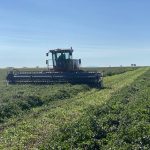The economic uncertainty circulating global financial markets, as the United States nears a so-called "fiscal cliff," is seen bearing potential to weigh on agricultural commodity markets as well.
However, analysts add, the extent of such fallout on grains and oilseeds remains to be seen.
A combination of tax increases and spending cuts that would effectively take US$600 billion out of the U.S. economy and send the country into a recession are set to kick in as of Jan. 1, 2013.
Both the Democrats and Republicans would like to prevent such a fiscal contraction scenario — first described as a "fiscal cliff" in February by U.S. Federal Reserve chairman Ben Bernanke — but the two parties are at odds over how to do that.
Read Also

India slaps 30 per cent import duty on yellow peas
India has imposed a 30 per cent duty on yellow pea imports with a bill of lading date on or after Nov. 1, 2025.
The political impasse in the U.S., and concerns that a solution to the looming "cliff" will not be found in time, were already behind much of the weakness seen in the North American equity markets following the Nov. 6 U.S. election, according to financial analysts.
The fiscal cliff and resulting U.S. recession would first weigh on crude oil prices, which would spill over to the agricultural commodities, said market analyst Errol Anderson of ProMarket Communications in Calgary.
"We’re in a broad-based commodity market sell-off, and it will affect all sectors of the economy," he said.
While major Canadian crops, including canola and barley, are in short supply, Anderson said pricing in the commodities will still need to respect what’s going on in the wider world.
For canola, the fiscal cliff, along with economic uncertainty in Europe and Asia, suggests canola exports will slow, which would lead to a larger carryout, he said.
If a solution is found preventing the fiscal cliff, Anderson said it would only delay the inevitable. "It kicks the can down the road, but it doesn’t change the problem."
As a result, Anderson recommended farmers sell into rallies, and respect the power of the global economic currents. He added that "2013 will not be a good year for commodities… but then the green economic buds will start."
"Basically immune"
Should the fiscal cliff arrive without a resolution and the stock market begins to drop sharply, the index and trend following funds would exit their grain and oilseed positions as part of the general reaction, added grains analyst Tim Hannagan, of Alpari LLC in Chicago.
However, aside from that initial fund liquidation, he expected the grain markets would show some firmness relative to the other financial and energy markets.
"Grains are basically immune to political and financial turmoil," as food is essential to live, he said.
"Even during the Great Depression when a large majority of the working public was unemployed, people gained weight," said Hannagan. People who aren’t working may not be eating as high quality food, but they are still eating.
"History shows that during economic uncertainty, people consume more food," he said, adding that when times are good, people also consume more food. "Ultimately, the people controlling the trade in the market understand this."
— Phil Franz-Warkentin writes for Commodity News Service Canada, a Winnipeg company specializing in grain and commodity market reporting.












